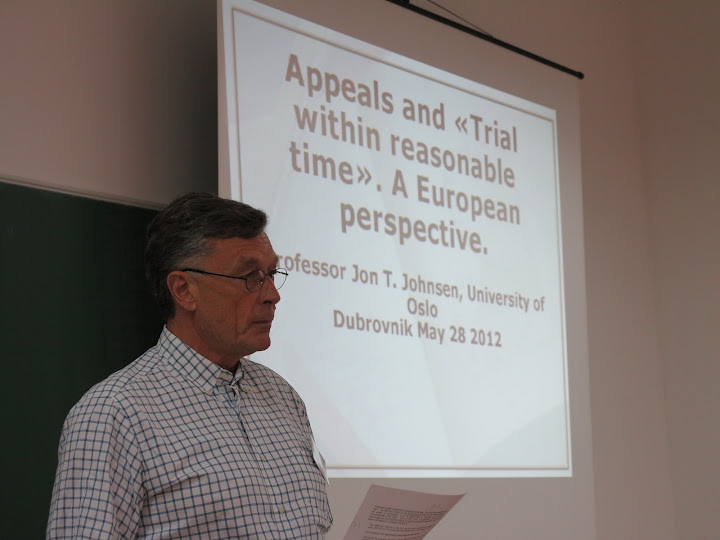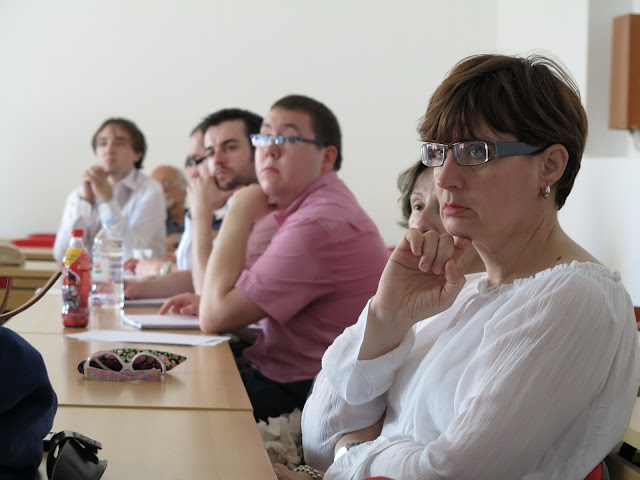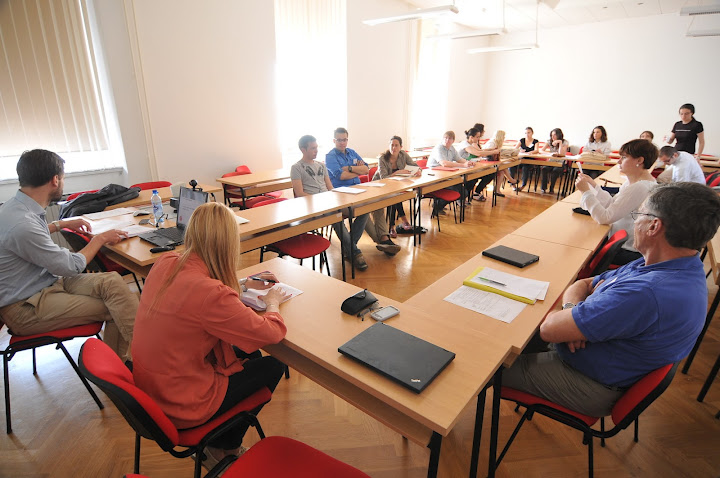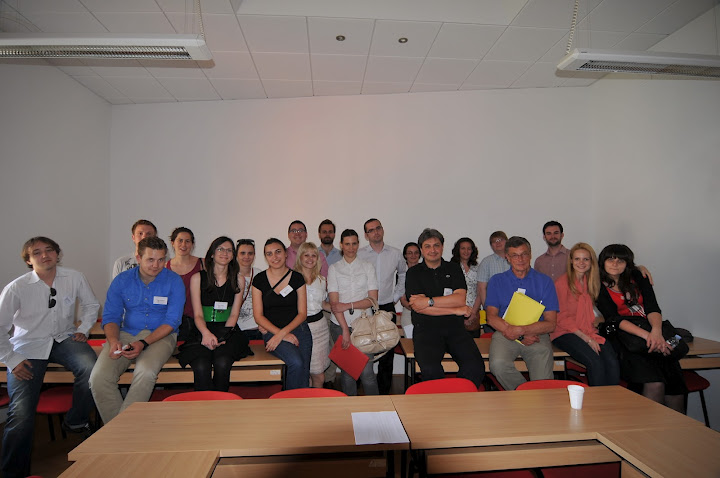Iuss Buss (Oslo) and Legal clinic of the law faculty in zagreb
an exchange of experiences on outreach and clinical work
Meet the Norwegians, part I
This 'adventure', as you may call it, started on a late Dubrovnik evening. Although we were all a bit tired from the intense Public and private justice seminar that week, and our friends from Norway had just got off the plain, we were all eager to set this project in motion. In our first meeting with the Norwegian 'team', lead by professor Jon T. Johnssen and Olaf Halvorsen Roning, and professor Alan Uzelac speaking on behalf of our clinic, we covered the basic topics that were on schedule for the next day. In that short introductory conversation we realised that both of our legal clinics had much more in common than we thought, and we were looking forward to continuing our discussion the next day.

The morning session started with the lecture of Mr. Olaf Halvorsen Roning on human rights standards for legal aid in appeal cases, which was a real eye opener. The lecture was followed by a panel discussion on an effective protection of rights as a by-product of legal education. Along with our Norwegian colleagues, the representatives of legal clinics from Great Britain, Montenegro, Italy and Netherlands participated in the panel. Despite the fact that the Zagreb legal clinic does not have a long history, unlike Iuss Buss or the clinics from Great Britain, we were able to keep up with the general discussion, which motivated us to get as much experience from this panel, and their work, as possible.
A comparative view
As we said at the beggining, most of the similarities were found within the Iuss Buss clinic, which was the role model for the Zagreb legal clinic. Both of our clinics are divided into groups. The Norwegian clinic has four groups: the immigration group, prisons and tenancy group, family and debt law group and finally, the labour group, dealing also with pensions, social security law etc. Our clinic is divided into eight groups: asylum seakers group, antidiscrimination and minority rights protection group, children's rights and maintenance group, victims' and witnesses' protection group, labour group, patients' rights group and an ad hoc debt law group.
The main part which our clinic has to work on is the lobbying and putting our outreach projects into motion. Hopefully, we will add the cooperation with our prison system into our outreach projects, along with the already existing ones: dealing with the problems of homeless people and expanding our area of influence to other cities in Croatia by forming external clinics. For that reason, our PR group is being revitalised, and it will deal only with these issues.
The biggest difference between our clinics is the fact that the Norwegian students take a year off from their studies, and dedicate themselves to the clinic fulltime. They also get paid for this, unlike in Zagreb, where the clinic is a part of the curriculum, and the work is voluntary. Obviously, there are good and bad sides to both of these organisational methods, especially with the issue of student motivation. For example, if the students do get paid for their work, do they apply for the clinic only because of that, or vice versa, do the students who volunteer do a better job, and are more motivated to work at the clinic and take out a lot of the fact that they helped somebody? Also, there is the issue of working hours students put into the clinical work, when we compare the Oslo and Zagreb clinic. Students in Zagreb are limited by the curriculum, while the students in Oslo do not have to worry about their exams during their year at the clinic. After they have finished their first year, they stay at the clinic as senior students for another six months, as mentors for their groups, working part-time. In Zagreb, there is no limitation to how long a student can stay working at the clinic; we are limited only by our own curriculum and free time.
Where one road ends, another begins
In the light of these newly acquired information, our brainstorming session continued on a beautiful beach near the Inter University Center, as a small reward after a hard day's work. Unfortunately, we had to leave Dubrovnik the next day, but we were looking forward to meeting the Iuss Buss team in Zagreb for the second part of our exchange.
Upon their arrival, we took the Oslo students and their director Olaf to see the most famous parts of the town centre. Our tour started in front of the hotel Laguna where Oslo students were situated. We showed them the Cibona tower, the Tehnical museum, the Student Center, the Croatian National Theatre, the Faculty of Law, Zrinjevac, Regional and Supreme Court, the main Square in Zagreb, the Cathedral, Dolac market, passage Octagon, Cvjetni Square and finished in Ilica street. During this time we discussed the differences between living in Zagreb and in Oslo. We found out that Oslo has a smaller population than Zagreb. They also have higher incomes, but everything is much more expensive.
After the tour, we took our Norwegian colleagues to an informal dinner to Medvedgrad pub in Ilica street where we hung out and shared our experiences of working in the clinic.
Meet the Norwegians, part II
 On Monday, at the Faculty of Law on Marshal Tito Square 3, the representatives from every group of our clinic, along with some academic mentors met with Oslo students and Olaf Halvorsen Roning, their director. At the morning session a Iuss Buss student, Lars Mathias Enger and Olaf Halvorsen Roning represented their clinic and later on, the same was done by our student Juraj Brozović and professor Alan Uzelac. Their presentations were followed by a discussion and a comparison of the two clinics. The organisational aspect of the Iuss Buss was again covered, for the sake of our colleagues from Zagreb, who were not a part of our Dubrovnik experience. The most astonishing information was the number of cases Iuss Buss handles every year, which revolves around 6000 cases. Groups of five people deal with them, divided into the mentioned groups. The main reason for such a big number of handled cases is the fact that Iuss Buss considers giving general information as cases, which Zagreb clinic does not. Iuss Buss also considers telephone calls as cases, unlike Zagreb, so the case number did not seem so overwhelming after all. Their working ours are from 10 am to 3 pm, except on Tuesdays, when they work from 5 pm to 8 pm. In comparison, our working hours are every day from 9 am to 12 pm, with the exception of Thursdays when we, besides the morning shift, have an afternoon shift aswell. Even though our clients are mostly called in, we have open hours on Tuesday mornings and in our afternoon shift on Thursday from 4 pm to 7 pm.
On Monday, at the Faculty of Law on Marshal Tito Square 3, the representatives from every group of our clinic, along with some academic mentors met with Oslo students and Olaf Halvorsen Roning, their director. At the morning session a Iuss Buss student, Lars Mathias Enger and Olaf Halvorsen Roning represented their clinic and later on, the same was done by our student Juraj Brozović and professor Alan Uzelac. Their presentations were followed by a discussion and a comparison of the two clinics. The organisational aspect of the Iuss Buss was again covered, for the sake of our colleagues from Zagreb, who were not a part of our Dubrovnik experience. The most astonishing information was the number of cases Iuss Buss handles every year, which revolves around 6000 cases. Groups of five people deal with them, divided into the mentioned groups. The main reason for such a big number of handled cases is the fact that Iuss Buss considers giving general information as cases, which Zagreb clinic does not. Iuss Buss also considers telephone calls as cases, unlike Zagreb, so the case number did not seem so overwhelming after all. Their working ours are from 10 am to 3 pm, except on Tuesdays, when they work from 5 pm to 8 pm. In comparison, our working hours are every day from 9 am to 12 pm, with the exception of Thursdays when we, besides the morning shift, have an afternoon shift aswell. Even though our clients are mostly called in, we have open hours on Tuesday mornings and in our afternoon shift on Thursday from 4 pm to 7 pm.
Another important difference is the issue of taking cases into the clinic. Oslo clinic does not take in a case if it does not belong to a branch of law for which a group is established. Zagreb clinic takes in all the cases. The Oslo students work in groups during their working hours, while the Zagreb students take in cases in their shifts and give general information. They work on cases at home and in group meetings.
Oslo students work without the help of academic mentors, and they are supervised only by more experienced students. They have insurance in case of malpractice and negligence
and they have to obey the legal ethics as lawyers do. That means that all the information stays within the group which is dealing with a case.
Zagreb students give written opinions and advice, which are corrected by student mentors first, and then revised and signed by one of the academic mentors. Our college also provides insurance in case of a lawsuit, or a mistake done by the Clinic.
After this panel discussion, the afternoon session was held in the Zagreb Legal Clinic in Tkalčićeva street 48/50. We showed them our space, rooms and organization of Clinic. They were able to see how the files and cases are handled. Our administrators showed them the Clinicarium, our electronic database. They were explained that we take in cases by e-mail, post or we call in clients. Because of the fact that we do not see each other as often as they do in their clinic, private Facebook groups have been formed, by which we communicate on a daily basis, and the students are also connected by e-mail. They were very sceptical about us discussing cases on Facebook because they thought of it as an invasion of privacy and secrecy of personal data. This is considered necessary, because we are a big group, and it is easier to control what everbody is doing, and that we do not miss any deadlines and make mistakes, for example. They were assured that the students are very cautious with the personal information they discuss.
Outreach
During the Tuesday morning session, which was held at the same place as the previous day, we discussed the influence of Legal Clinics in general, and lobbying as a big factor in raising funds for the projects and influencing the public opinion, and event the government. The Zagreb clinic does not have a specific project involving lobbying yet, but there is an incentive to form a special lobbying group, which would take on this idea, and maybe start changing the social climate in Croatia.

Later on in the day, during the workshop session, different outreach projects that each Iuss Buss group has were discussed. The biggest difference we stumbled upon was between our criminal law groups. The Iuss Buss clinic takes the bus to prisons in the Oslo region, where they talk to prisioners about their rights, transfers to another prison or state, about their health care, paroles, resocialization. We found out that their clinic does not deal with victims and witnesses of crimes, because they get support from different organizations. Our clinic works only with victims and witnesses, but we think that the prison project is a very good idea and that we are ready to start dealing with those types of cases.
Other main difference between our groups is that their debt group represents only the debtor, and our clinic deals with both sides.
As for writing appeals and lawsuites, our Oslo colleagues are allowed to write them. We are limited by the law, and can only handle some specific cases in the administrative law area.
At the afternoon session held in rooms of Legal Clinic, in the presence of prof. Johnsen, our students got the chance to represent different outreach projects of the Zagreb Clinic more elaborately. Projects which have already started or are about to start were introduced in this session. One of them is the above mentioned project dealing with street law and homeless people, in which clinicians educate homeless people and their guardians about rights they have and how they can achieve them. Other project is connected to different non-governmental organizations and how we can approve our cooperation. There is also the idea for our students to go to different cities throughout Croatia to provide free legal aid.
Final thoughts
On Wednesday morning our professor and director of Zagreb legal clinic, Alan Uzelac, and the dean of Faculty of law in Zagreb, Zoran Parać, held short introductory speeches. This was followed by a lecture from professor Jon T. Johnsen about legal education of clinicians and legal aid in Norway. The professor covered most of the topics from the previous days, but he mostly spoke of the project with the prisons in Oslo. He pointed out the main problems they encounter while working with inmates and the prison system in general. One of them is the discrimination of immigrant prisoners by the inmates of Norwegian nationality. Also, one of the biggest problems Iuss Buss has to deal with is the discriminatory policy towards asylum seekers and illegal immigrants. They have had very little success in preventing them being deported back to their countries. The next day professor Johnsen and professor Uzelac had a private meeting, as a great closure to this great exchange project.
In conclusion, we believe this past few days were of great value for both sides. Hopefully, this cooperation between Iuss Buss and Zagreb Legal clinic will grow, and that this is just the beginning of a great friendship.
Students:
Iva Štrbulec-Težak & Anita Tkalčević

